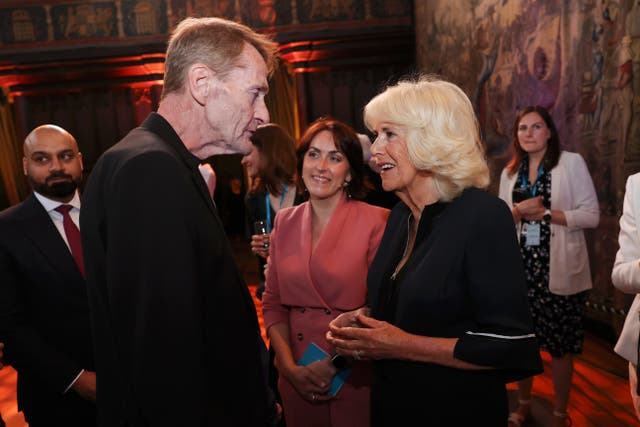
British authors Lee Child and Howard Jacobson as well as famous faces Ozzy Osbourne and Debra Messing are among those calling for the end of boycotts against Israeli authors, festivals and literary institutions.
More than 1,000 people from the literary and entertainment industry have signed an open letter from the group Creative Community For Peace (CCFP) in “support of freedom of expression and against discriminatory boycotts”.
Jacobson said: “Art is the antithesis to a political party. It is a meeting place, not an echo chamber. Art explores, discovers, differs, questions and surprises. Precisely where a door should be forever open, the boycotters slam it closed.”
He won the 2010 Booker Prize for The Finkler Question, which deals with what it means to be Jewish, as well as friendship.

The letter says, amid the war in the Middle East, that signatories are “shocked and disappointed to see members of the literary community harass and ostracise their colleagues”.
Child said: “Politically targeting novelists, authors and publishing houses based on their nationality is misguided.
“At a time when dialogue is paramount and when compromise can lead to peace, castigation and blanket boycotts are counter-productive.
“The written word, and the dissemination of it, must always be protected, especially in times of heightened tension.
“To achieve peace, we must humanise one another and build bridges across communities through the open exchange of ideas. Literature allows for that. Boycotts hinder it.”
The letter from CCFP, whose mission says it is against boycotting Israel, says: “We believe that writers, authors and books — along with the festivals that showcase them — bring people together, transcend boundaries, broaden awareness, open dialogue and can affect positive change.”
“We believe that anyone who works to subvert this spirit merely adds yet another roadblock to freedom, justice, equality and peace that we all desperately desire.
“Regardless of one’s views on the current conflict, boycotts of creatives and creative institutions simply create more divisiveness and foment further hatred.”

Pulitzer winner David Mamet, Nobel for Literature honourees Herta Muller and Elfriede Jelinek, Osbourne’s wife Sharon Osbourne, Kiss star Gene Simmons, Stand By Me actor Jerry O’Connell and talent manager Scooter Braun have also signed the letter.
It comes after Irish author Sally Rooney, Booker Prize winner Arundhati Roy, Pulitzer Prize winner Viet Thanh Nguyen and US writers Percival Everett and Rachel Kushner signed a letter along with others calling for a “mass boycott of Israeli publishers” in response to an unfolding humanitarian crisis in Gaza.
They claim that “Israeli cultural institutions, often working directly with the state, have been crucial in obfuscating, disguising and artwashing” the way Palestinians are treated by Israel.
This letter was organised by the Palestine Festival of Literature, who said more than 5,000 authors and publishing professionals have signed it.
Since Hamas militants attacked Israel on October 7, 2023, prompting the latest outbreak of conflict in the region, Gaza’s health ministry has said that more than 43,000 Palestinians have been killed.
Israel’s Parliament recently passed laws that could threaten the work of the main UN agency providing aid in Gaza.
It has claimed that UNRWA maintains close ties with Hamas – allegations the agency strongly rejects.
Israel says around 100 people are still kept as hostages and more than 1,200 of its citizens have been died during the conflict.


Why are you making commenting on The Herald only available to subscribers?
It should have been a safe space for informed debate, somewhere for readers to discuss issues around the biggest stories of the day, but all too often the below the line comments on most websites have become bogged down by off-topic discussions and abuse.
heraldscotland.com is tackling this problem by allowing only subscribers to comment.
We are doing this to improve the experience for our loyal readers and we believe it will reduce the ability of trolls and troublemakers, who occasionally find their way onto our site, to abuse our journalists and readers. We also hope it will help the comments section fulfil its promise as a part of Scotland's conversation with itself.
We are lucky at The Herald. We are read by an informed, educated readership who can add their knowledge and insights to our stories.
That is invaluable.
We are making the subscriber-only change to support our valued readers, who tell us they don't want the site cluttered up with irrelevant comments, untruths and abuse.
In the past, the journalist’s job was to collect and distribute information to the audience. Technology means that readers can shape a discussion. We look forward to hearing from you on heraldscotland.com
Comments & Moderation
Readers’ comments: You are personally liable for the content of any comments you upload to this website, so please act responsibly. We do not pre-moderate or monitor readers’ comments appearing on our websites, but we do post-moderate in response to complaints we receive or otherwise when a potential problem comes to our attention. You can make a complaint by using the ‘report this post’ link . We may then apply our discretion under the user terms to amend or delete comments.
Post moderation is undertaken full-time 9am-6pm on weekdays, and on a part-time basis outwith those hours.
Read the rules hereLast Updated:
Report this comment Cancel